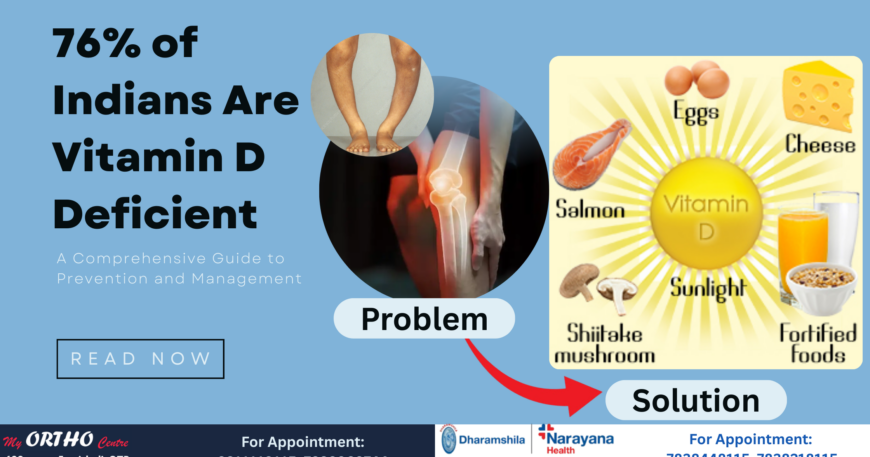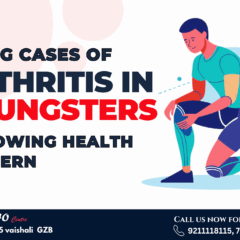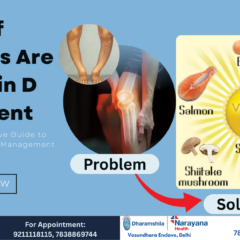
76% of Indians Are Vitamin D Deficient: A Comprehensive Guide to Prevention and Management
Vitamin D, often referred to as the “sunshine vitamin,” is essential for maintaining overall health. It plays a crucial role in calcium absorption, bone health, immune function, and muscle strength. However, recent studies indicate that 76% of Indians suffer from vitamin D deficiency, making it a significant public health concern. If left unaddressed, this deficiency can lead to severe health complications. In this article, we will delve into the importance of vitamin D, the causes of its deficiency in India, its impact on health, symptoms to watch for, and effective ways to prevent and manage it.
The Role and Importance of Vitamin D
Vitamin D is a fat-soluble vitamin that is naturally produced in the skin upon exposure to sunlight. It is also available in some foods and supplements. This vitamin plays a critical role in:
- Calcium and Phosphorus Absorption: Vitamin D facilitates the absorption of calcium and phosphorus in the intestines, essential for maintaining strong bones and teeth.
- Bone Health: Deficiency of vitamin D can lead to conditions such as osteoporosis, osteomalacia (soft bones), and an increased risk of fractures.
- Muscle Function: Adequate levels of vitamin D are necessary for muscle strength and coordination, reducing the risk of falls and injuries, especially in older adults.
- Immune System Support: Vitamin D enhances the pathogen-fighting effects of monocytes and macrophages, key white blood cells that are crucial for immune defense.
- Reducing Inflammation: Vitamin D has anti-inflammatory properties that may help manage conditions such as rheumatoid arthritis and inflammatory bowel disease.
- Mental Health: Deficiency of this vitamin has been linked to mood disorders, including depression and anxiety.
Why is Vitamin D Deficiency Prevalent in India?
Despite India being a tropical country with abundant sunlight, vitamin D deficiency is widespread due to several factors:
1. Limited Sun Exposure
The primary source of vitamin D is sunlight. However, modern lifestyles have reduced outdoor exposure significantly. Many people spend most of their time indoors, working in offices or studying in classrooms. Additionally, concerns over skin tanning and pollution contribute to the avoidance of direct sun exposure.
2. Dietary Deficiencies
Vitamin D is naturally present in very few foods. The Indian diet, particularly vegetarian diets, often lacks sufficient vitamin D-rich foods. While non-vegetarian sources like fatty fish (salmon, mackerel, tuna) and egg yolks provide vitamin D, these foods are not consumed regularly by a large portion of the population.
3. Skin Pigmentation
Darker skin contains more melanin, which acts as a natural sunscreen, reducing the skin’s ability to produce vitamin D from sunlight. This is particularly relevant in India, where most of the population has a darker skin tone.
4. Urbanization and Pollution
High-rise buildings, pollution, and smog in urban areas limit direct sunlight exposure. Pollution forms a barrier that prevents ultraviolet B (UVB) rays from reaching the skin, reducing vitamin D synthesis.
5. Cultural and Clothing Practices
Traditional clothing styles, such as burqas and saris with full-body coverage, can limit skin exposure to sunlight. Additionally, religious and social norms in some regions restrict outdoor activities, especially for women, increasing the risk of deficiency.
Symptoms of Vitamin D Deficiency
Vitamin D deficiency often goes unnoticed until it becomes severe. Common signs and symptoms include:
- Bone Pain and Weakness: A lack of vitamin D can lead to bone disorders like osteoporosis and osteomalacia, causing pain and weakness.
- Muscle Weakness and Cramps: Deficiency can result in muscle pain, cramps, and weakness, increasing the risk of falls.
- Fatigue and Tiredness: Persistent fatigue and lack of energy are often linked to low vitamin D levels.
- Frequent Infections: Since vitamin D plays a role in immune function, deficiency may lead to an increased susceptibility to infections like colds, flu, and respiratory illnesses.
- Depression and Mood Swings: Low levels of vitamin D have been associated with mood disorders, including depression and seasonal affective disorder.
- Slow Wound Healing: A deficiency can impair wound healing, making recovery from injuries or surgeries slower than usual.
- Hair Loss: Severe vitamin D deficiency has been linked to hair loss conditions such as alopecia.
Health Risks Associated with Vitamin D Deficiency
Long-term vitamin D deficiency can lead to serious health complications, including:
- Rickets (in children): A condition where bones become soft and deformed.
- Osteoporosis and Osteomalacia (in adults): Increased risk of fractures and bone pain.
- Cardiovascular Diseases: Research suggests that vitamin D deficiency may contribute to hypertension and heart disease.
- Autoimmune Disorders: Conditions like rheumatoid arthritis and multiple sclerosis may be linked to low vitamin D levels.
- Diabetes: Some studies indicate that vitamin D may play a role in insulin regulation and reduce the risk of type 2 diabetes.
- Cancer Risk: Low levels of vitamin D have been associated with an increased risk of certain cancers, including breast, prostate, and colon cancer.
How to Prevent and Manage Vitamin D Deficiency
To maintain adequate vitamin D levels, consider the following strategies:
1. Regular Sun Exposure
- Spend 10-30 minutes in the sun daily, preferably between 10 AM and 3 PM, when UVB rays are most effective.
- Expose larger areas of the skin, such as arms, legs, and back, to maximize vitamin D synthesis.
- People with darker skin tones may need longer exposure than those with lighter skin.
2. Dietary Sources of Vitamin D
- Fatty Fish: Salmon, mackerel, sardines, and tuna are rich sources of vitamin D.
- Egg Yolks: A convenient source for those who consume eggs.
- Fortified Foods: Milk, orange juice, and cereals are often fortified with vitamin D.
- Mushrooms: Some varieties, like shiitake and maitake, provide vitamin D, especially when exposed to sunlight.
3. Vitamin D Supplements
- If natural sources are insufficient, vitamin D supplements may be necessary.
- The recommended daily allowance (RDA) for vitamin D varies:
- Infants (0-12 months): 400 IU/day
- Children & Adults (1-70 years): 600 IU/day
- Elderly (>70 years): 800 IU/day
- Consult a healthcare provider before starting supplements, as excessive intake can lead to toxicity.
4. Lifestyle Modifications
- Encourage Outdoor Activities: Engage in outdoor exercises like walking, jogging, or yoga in open areas.
- Monitor Vitamin D Levels: Regular blood tests can help detect deficiencies early.
- Address Underlying Health Issues: Conditions such as kidney disease and obesity can impact vitamin D metabolism.
Conclusion
Vitamin D deficiency is a widespread issue in India, despite the country’s abundant sunlight. Given its vital role in bone health, immunity, and overall well-being, maintaining optimal vitamin D levels should be a priority. By incorporating sun exposure, vitamin D-rich foods, and supplements when necessary, individuals can prevent deficiency and its associated health risks. If you suspect a deficiency, consult a healthcare professional for testing and personalized guidance. Prioritizing vitamin D intake today can lead to a healthier future!


